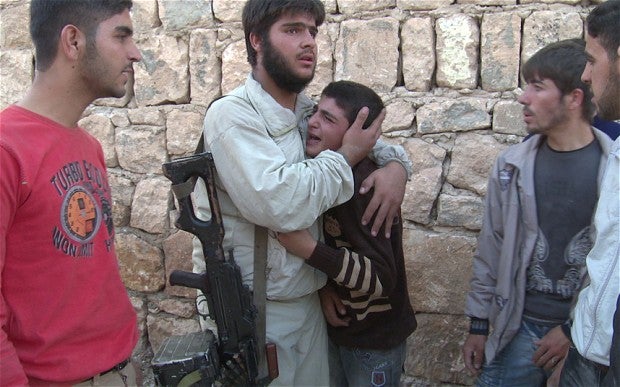TV review: Syria: Across the Lines - Channel 4 Dispatches
Israel: Facing the Future, BBC2

Your support helps us to tell the story
From reproductive rights to climate change to Big Tech, The Independent is on the ground when the story is developing. Whether it's investigating the financials of Elon Musk's pro-Trump PAC or producing our latest documentary, 'The A Word', which shines a light on the American women fighting for reproductive rights, we know how important it is to parse out the facts from the messaging.
At such a critical moment in US history, we need reporters on the ground. Your donation allows us to keep sending journalists to speak to both sides of the story.
The Independent is trusted by Americans across the entire political spectrum. And unlike many other quality news outlets, we choose not to lock Americans out of our reporting and analysis with paywalls. We believe quality journalism should be available to everyone, paid for by those who can afford it.
Your support makes all the difference.A sharply defined border can be a cruel thing. Right now, the Orontes river in Syria is as sharply defined as they come, engineered at some point into an arrow-straight waterway that cuts through flat fields and farmland.
On one side, the splintered cohorts of the Free Syrian Army. On the other side, Assad loyalists and government troops. And for both of them the river marks the point at which neighbour and countryman turns into enemy and terrorist. Olly Lambert's film Syria: Across the Lines – Channel 4 Dispatches was about a mental border as well, though, the fence between "them" and "us" that can happily fall into disrepair in times of peace but is reinforced and strengthened by every act of violence in times of war.
Tellingly, he started his film with a young man who'd moved from one side to the other – a young mechanic called Ahmad who defected from the Syrian police after being ordered to suppress demonstrations. "I looked evil when I served the regime. I was full of hatred," said Ahmad showing the camera an ID photograph of a clean-shaven cadet. "This photograph is the real me," he added, pulling out a picture of himself with the beard he's grown since.
Lambert crossed the divide too, visiting the no man's land between the opposing forces with a farmer who wanted to check on his rotting crops. That was an excursion that ended in a ditch, heavy breathing on the soundtrack as Lambert took cover from the gunfire that had greeted them. He didn't appear to be a lot safer behind the front line, capturing several attacks on the villages that now harbour Sunni refugees.
At one moment, he would be filming children playing in the streets with wooden guns, at the next, a cloud of smoke would blossom over the rooftops with a reverberant boom and he would cut to the aftermath, the shocking brilliance of fresh blood in plaster dust. Loudspeakers called doctors and nurses to the hospital but once there all they could do was supervise the dying.
On the other side of the Orontes river there was no uncertainty. "Our duty is to defend this homeland, to protect unarmed civilians and to attack militants," said a Syrian officer. For him, the people on the other side of the river weren't civilians any more, weren't truly Syrian. Or at least the kind of civilians that didn't deserve defending anyway. A local Ba'ath party official insisted that his former Sunni neighbours were "planning to wipe us out. They don't even think of us as human". Which meant that he didn't need to think of them as human either. His barricade against empathy was exactly mirrored on the other side, every new horror nailing another plank into place.
After an air raid had destroyed another house, killing several refugees, one man vowed to take revenge on Alawites and civilians. Ahmad, we learnt at the end, was now planning to join Jabhat al-Nusra, an extremist Islamic militia. "There'll be vendettas for 50 years as a result of these crimes," said one bitter man. I could tell you which side he was on but it really doesn't matter because he'll have his counterpart across the river. A brave, revealing, depressing film. If only Lambert had taken some students with him it might have got the publicity it deserved.
Israel: Facing the Future wasn't exactly a barrel of laughs either, John Ware exploring another polarised region, miles down the road of congealed resentments that Syria has just started along. It confirmed a truth touched on in Lambert's film – that religious zealotry can force itself into the tiniest crack between communities and open it wider, and it presented a bleak prospect for the future. He ended with an optimist, though, a former Mossad man who thought both sides would eventually come to some compromise. "But it'll only happen one minute before midnight," he said. I hope their watches are synchronised.
Join our commenting forum
Join thought-provoking conversations, follow other Independent readers and see their replies
Comments